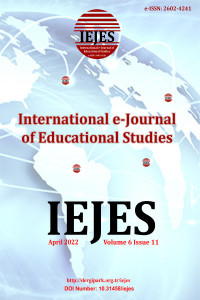Examination of the Relationship between Competencies of Candidate Teachers in Classroom Management and Teacher Efficacy
Teacher candidates, teacher efficacy, competencies in classroom management
Examination of the Relationship between Competencies of Candidate Teachers in Classroom Management and Teacher Efficacy
___
- Aksu, F. (2009). Analyzing first stage primary education teachers’ efficacy according to their classroom management skills and some variables. Unpublished master’s dissertation, İstanbul: Maltepe University Institute of Social Sciences.
- Albayrak, F. T. (2015). The relationship between the professional values and the teacher sense of efficacy of primary school teachers: Erzurum city sample. Unpublished master’s dissertation, Erzurum: Atatürk University Institute of Educational Sciences.
- Baloğlu, N. & Karadağ, E. (2008). Teacher efficacy and Ohio teacher efficacy scale: adaptation for Turkish culture, language validity and examination of factor structure. Educational Administration: Theory and Practice, 56, 571-606.
- Bandura, A. (1977). Self-efficacy: toward a unifying theory of behavior change. Psychological Review, 84, 191-215.
- Çoban, G., S. & Cizrelioğulları, M., N. (2021). Okul öncesi öğretmenlerinin sınıf yönetimine dair görüşleri [Preschool teachers’ views on classroom management]. Journal of Computer and Education Research, 9 (17), 248-277. DOI: 10.18009/jcer.856884
- Erol, E. (2014). Classroom management competencies of teachers (Mani̇sa province Sarıgöl, Alaşehi̇r town’s model). Unpublished master’s dissertation, Denizli: Pamukkale University, Institute of Educational Sciences.
- George, D., & Mallery, P. (2003). SPSS for windows step by step: A simple guide and reference (4th ed.). Boston: Allyn & Bacon.
- Gordon, L.M. (2001). High teacher efficacy as a marker of teacher effectiveness in the domain of classroom management. Paper presented at the annual meeting the California Council on Teacher Education, San Diego, CA.
- Gökyer, N. & Özer, F. (2014). The perception of candidate teachers related to competencies in classroom management. International Periodical for the Languages, Literature and History of Turkish or Turkic, 9(2), 691-712.
- Gynne, A., Persson, M. (2018). Teacher roles in the blended classroom-swedish lower secondary school teachers’ boundary management between physical and virtual learning spaces. Journal of Computer and Education Research, 6 (12), 222-246. DOI: 10.18009/jcer.442499
- Henson, R. K. (2001). Relationships between preservice teachers' self-efficacy, task analysis, and classroom management beliefs. In the annual meeting of the Southwest Educational Research Association, New Orleans, LA.
- Hicks, S. D. (2012). Self-effıcacy and classroom management: a correlatıon study regardıng the factors that ınfluence classroom management. Degree Doctor of Education, Liberty University, Virginia.
- Karasar, N. (2014). Bilimsel araştırma yöntemi [Research method] (26th Ed.). Ankara: Nobel Yay.
- Korkut, K. (2009). The connection between form tutor/class teachers' confidence in self-efficacy and their perceptions in classroom management. Unpublished Doctorate Dissertation, Mehmet Akif Ersoy University Institute of Social Sciences, Burdur.
- Kuran, K. (2002). Öğretmenlik mesleği (Teaching profession) (A. Türkoğlu [Ed.] Öğretmenlik Mesleğine Giriş [in Introduction to teaching profession]). Ankara: Mikro Publication.
- Özdemir, İ. (2015). Acting on science and technology teachers' professional burnout variables forecasting with artificial neural network (The sampling of Zonguldak). Unpublished doctorate dissertation, Kırşehir: Ahi Evran Üniversitesi Institute of Science.
- Richardson, A. G. & Thomas, A. A. (1989). Characteristics of the effective teacher as perceived by pupils and teachers: A Carribean study. Paper presented at the annual meeting of the American Educational Research Association. San Francisco, California.
- Slavin, R. E. 2003. Educational psychology: Theory and practice. Boston: Allyn and Bacon.
- Şahin, Z. S. (2010). The attitude of kindergarten teachers to their job and the investigation by some variable of adequacy perception. Unpublished master’s dissertation, Konya: Selçuk University Institute of Social Sciences.
- Turan, S. (2006). Foundations of classroom management. (M. Şişman & S. Turan [Eds]) in Classroom Management in Theory and Practice, pp. 1–11.) Ankara: PegemA Publications
- Tschannen-Moran, M., & Woolfolk-Hoy, A. (2001) Teacher efficacy: Capturing an elusive concept. Teaching and Teacher Education, 17, 783-805.
- Tschannen-Moran, M. & Woolfolk-Hoy, A. (2002). The influence of resources and support on teachers’ efficacy beliefs. The Annual Meeting of the American Educational Research Association, New Orleans.
- Wolters, C. A. & Daugherty, S. G. (2007). Goal structures and teachers’ sense of efficacy: their relation and association to teaching experience and academic level. Journal of Educational Psychology, 99(1), 181–193.
- Woolfolk-Hoy, A. 2000. Changes in teacher efficacy during the early years of teaching. AERA Annual Meeting, Ohio State University.
- Yılmaz, Z. N. & Aydın, Ö. (2015). Investigation of primary school teachers’ perceptions of classroom management skills with respect to some variables. Mersin University Journal of the Faculty of Education, 11(1), 148-164.
- Başlangıç: 2017
- Yayıncı: Tamer KUTLUCA
Evaluation of Nursing Students’ Perceptions about Classroom Climate and the Associated Factors
Yeter KURT, Kadriye ÖZKOL KILINÇ, Havva ÖZTÜRK
The Experiences of Nursing Students towards Distance Education during the COVID-19 Pandemic
İlknur ÖZKAN, Secil TAYLAN, Emine İLASLAN
Students Perceptions of Homework as a Formal Assessment Method
The Role of Women’s Organizations towards the Development of the Idea of University
Tamar SİRADZE, Dali DOBORJGİNİDZE
Asuman Seda SARACALOĞLU, Mehmet ALTIN
Dylan CROMHOUT, Rodney DUFFETT, Pieter STEENKAMP
Preservice Science Teachers’ Perceptions of Artificial Meat in the Context of Socio-Scientific Issue
